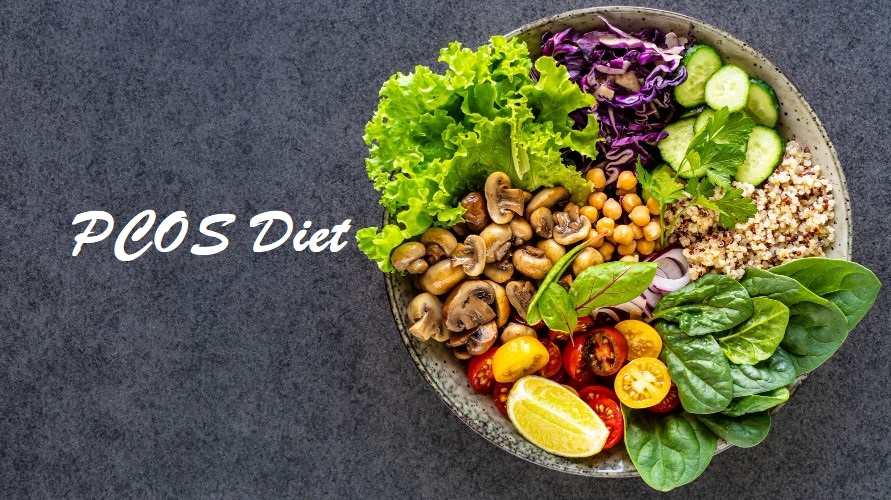PCOS, or Polycystic Ovary Syndrome, is a little-understood hormonal condition that can cause several unwelcome side effects in women. As such, many women with PCOS find themselves struggling to balance the often-competing demands of balancing diet, stress, and exercise in their day-to-day lives. Fortunately, by understanding what foods are good for PCOS and which ones should be avoided at all costs, it’s possible to achieve a healthier balance in your daily routine. Before knowing more about the PCOS diet and great food for PCOS, take a look at PCOS and its relation with food. So let’s dig in:
What is PCOS?
PCOS or Poly Cystic Ovarian Syndrome is tagged as a hormonal dysfunction with irregular menstrual cycles or no periods at all. Women with PCOS usually have multiple cysts in their ovaries, caused by the overproduction of the male sex hormone androgen. An endocrine condition is extremely prevalent among those who were genetically programmed to be female. According to research, about more than 50% of women with PCOS suffer from obesity, hirsutism, chronic acne, and male pattern baldness. Studies show that modifying your diet and your daily routine can help you control PCOS symptoms.
Connection between what you eat and PCOS
PCOS has some connection with what you eat and the lifestyle you follow. Dietary changes majorly impact PCOS in two areas: weight control, insulin production and resistance.
Researches say that more than 50 percent of women with PCOS have the chance of developing diabetes or pre-diabetes before the age of 40. Following a diet that meets a person’s nutritional needs, maintains a healthy weight, and promotes good insulin levels can help people with PCOS feel better.
Manage Proper Insulin Level
Insulin levels in PCOS patients usually test above average. The pancreas secretes the hormone insulin and it aids in the conversion of glucose (sugar) into energy in the body’s cells. An increase in blood sugar can occur if not enough insulin is produced. This can also occur if your body is resistant to the insulin it produces.
In an effort to maintain normal blood sugar levels, the body of an individual with insulin resistance may secrete excessive amounts of insulin. Elevated insulin levels have been linked to increased production of androgens in the ovaries, including testosterone. So managing insulin levels with a balanced PCOS diet is key to managing PCOS conditions.
Having a more significant body mass index is also associated with insulin resistance. People with polycystic ovary syndrome (PCOS) commonly struggle with insulin resistance, which can make it difficult to lose weight.
Refined carbs, such as sugary and starchy foods, might increase insulin resistance, making it harder to lose weight.
Also, read about intermittent fasting for weight loss
Dietary Changes for PCOS
Your eating habit is linked to PCOS, according to health experts. However, there isn’t really a recommended diet for PCOS right now. Still, experts suggest some great food for PCOS that helps in the management of PCOS conditions and foods that should be avoided by a PCOS patient.
Given below are the most recommended PCOS diet that could help victims in reducing PCOS symptoms in some women:
- An anti-inflammatory diet
There is some evidence that eating anti-inflammatory foods like fatty salmon, fruits, leafy greens, berries, and extra virgin olive oil can assist in relieving inflammation-related symptoms like exhaustion.
- Diets with a low glycemic index (GI)
Foods with a lower GI are digested more slowly and don’t raise insulin levels as quickly as other foods, particularly some carbs. A low GI diet consists of whole grains, beans, seeds, fruits, starchy vegetables, nuts, etc. Reduce the intake of unprocessed food and stick on to more low-carbohydrate food which will not raise your insulin levels.
- Dietary Approaches to Stop Hypertension (DASH)
The Dietary Approaches to Stop Hypertension (DASH) diet is commonly prescribed by medical professionals to lessen the severity of heart disease or prevent it altogether. Following a DASH diet not only prevent the risk of heart disease but also aid in the control of PCOS. A DASH diet includes fish, poultry, fruits, vegetables, whole grains, and low-fat dairy products. Saturated fat and sugary foods are discouraged in the DASH diet.
- Foods high in vitamins and minerals
Foods that are rich sources of vitamins and minerals are the best options to keep your body healthy. According to research, symptoms of polycystic ovary syndrome (PCOS) can be alleviated, and insulin resistance can be improved by eating foods rich in vitamin D, vitamin B, iodine, selenium, and magnesium.
- Pick Carbohydrates That Are Good For You
Women who have polycystic ovary syndrome are more likely to develop type 2 diabetes than women who do not have PCOS. Women with PCOS should follow a diet similar to that of people with diabetes, emphasising high-quality carbs. Your blood sugar levels will improve as a result of this.
- High Fire Foods
High-fibre foods can help us fight insulin resistance by slowing digestion and lowering the impact of sugar on blood sugar, which in turn helps PCOS patients. Health experts suggest including cruciferous vegetables such as broccoli, cauliflower, and Brussels sprouts; green vegetables such as red leaf lettuce and arugula; beans and lentils; berries; almonds, sweet potatoes, pumpkin, and so on.
Basic Diet Plan for PCOS
Researchers looking for a range of healthy PCOS diet plans recommends you follow a balanced food plan. The basic thing you need to remember is to avoid refined sugar and carbohydrate, processed food, sugary beverages and energy drinks, etc. Find the below list of healthy food for PCOS sufferers.
Stick to a healthy, well-balanced Menu
A PCOS diet that is both varied and complete will support homeostasis, the physiological condition in which all of a person’s systems are in equilibrium. Eating a well-balanced, nutritious PCOS diet is essential for insulin to transport glucose to your cells for its proper utilisation as fuel. You can get relief from PCOS by reducing your body’s production of androgens by lowering your insulin levels.
Keep to a routine and set meal times
Do not go without eating. If you skip meals, your blood sugar drops, which can trigger cravings and overeating. Consistency is the key to stabilising blood sugar. Maintaining healthy blood sugar levels can help your body produce and use androgens effectively. The severity of PCOS symptoms is inversely proportional to the level of androgens produced. Smaller, more frequent meals have been suggested by some doctors as a way to better control blood sugar and develop healthy routines.
Helpful Foods Rich in Vitamins and Minerals for PCOS
- Vitamin D: eggs, mushrooms, salmon, and fortified milk
- Vitamin B8: almonds, tuna, strawberries, eggplant, oranges, beans, and corn
- Iodine: Eggs, salmon, Turkey breast, yogurt, and Himalayan salt
- Selenium: spinach, fortified whole grains, salmon, pork, cottage cheese, tuna, eggs, and turkey
- Magnesium: dark chocolate, seeds, bananas, nuts, whole grains, and avocados
Foods for PCOS
- Cruciferous vegetables like cauliflower
- Green leafy vegetables
- Beans and lentils
- Bell peppers
- Berries
- Sweet potatoes
- Almonds
- Winter squash
- Pumpkin
- Tomatoes
- Walnuts
- Olive oil
- Berries
- Fatty fish high in omega-3 fatty acids (Eg: Salmon and Sardines)
Foods To Avoid by PCOS Patients
Dieters attempting to control PCOS symptoms should steer clear of what is generally considered unhealthy fare. All of these things:
- White bread, packaged cookies, and other refined carbs.
- Fast food and other fried dishes.
- Beverages with a lot of sugar, such as sodas and energy drinks.
- Sausages, luncheon meats, and other processed meats.
- Solid fats like margarine, butter, lard, and shortening
- Steaks, burgers, and pork chops galore.
Why and when should you see a doctor?
If you are having irregular periods or no menstruation, excessive hair growth on your face and body, weight gain, etc, it is time to consult a doctor. Your doctor may prescribe thyroid tests, prolactin tests, and an ultrasound scan to detect cysts in the ovaries. Look for the below symptoms of PCOS before you see a doctor.
Symptoms of PCOS include:
- Acne
- Hair growth on the face, chest and other body parts
- Excessive weight gain, especially around the abdomen
- Excess sebum production
- Menstrual irregularity
- Discomfort centred around the pelvis
- Infertility
- Skin tags on neck and underarm area (rare cases)
It’s possible that many people who have these symptoms won’t bother going to the doctor about them. People often wait until they are having problems conceiving before consulting a doctor.
It’s important for anyone experiencing these signs to talk to their doctor about them; the sooner they start treatment, the sooner they’ll start feeling better.
Issues to consider:
There is some leeway in the PCOS diet; thus, the specifics may vary from person to person. If you decide to try this PCOS diet in an effort to alleviate your symptoms, there are some things you should always keep in mind.
Typical Dietary Guidelines
Inadequate food intake due to the laxity of this dietary plan is uncertain. However, your overall health can be affected by not getting enough nutrients. The PCOS diet may need to include supplements if the patient is deficient in any vitamins.
Versatility:
Fast food, drive-thrus, and other chain restaurants and convenience store menu items often feature several of the PCOS diet’s no-nos. Poor dietary choices, such as frequent consumption of French fries, big servings of high-fat, high-carb meals, and salty, sugary, packaged snacks, can exacerbate PCOS symptoms and health problems.
Hypertension (high blood pressure), for instance, can be caused by a diet heavy in sodium, which in turn raises the risk for cardiovascular disease. Insulin resistance can be aggravated by the extra and sometimes concealed sugar found in processed foods, baked products, and soft drinks.
It’s a good idea to peruse the menu ahead of time if you’re going out to eat. Having a general idea of what goes into your food, how it’s made, and how much you’ll get will make it much easier to order something that matches your PCOS diet.
Care and fellowship:
It’s natural to connect with those who understand what you’re going through when dealing with a chronic illness. People who have polycystic ovary syndrome can find local and virtual support groups. Patients can also connect with many reputable institutions through their websites, social media profiles, blogs, and forums. Whether you are opting for allopathy or PCOS ayurvedic treatment, make sure that the health care centre you have decided on has proven experience in this field.
Inquire as to what others have tried for their PCOS diet and what they found to be effective. While you should never blindly follow anybody else’s advice, these conversations can provide useful pointers to consider and can serve as a source of inspiration, motivation, and emotional support.
Cost:
Vitamin and mineral supplements, if prescribed as part of a PCOS diet, can add up quickly. Inquire with your doctor about getting these supplements on prescription. If your doctor prescribes these supplements and you have health insurance, the costs can be covered in whole or in part.
Conclusion
It’s important to give your new PCOS diet a fair shot after you’ve started it. Listen to your body and make small, gradual changes to your diet until you find what works best for you. By paying attention to how you feel after you eat certain foods, you can fine-tune your PCOS diet plan to minimize symptoms and maximize health benefits. The signs and symptoms of PCOS vary from woman to woman. Your doctor will be able to assist you in designing an individualized diet plan that’s right for you.



